Module 5 A Trip Along the Three GorgesGrammar PPT课件(33张ppt)
文档属性
| 名称 | Module 5 A Trip Along the Three GorgesGrammar PPT课件(33张ppt) |
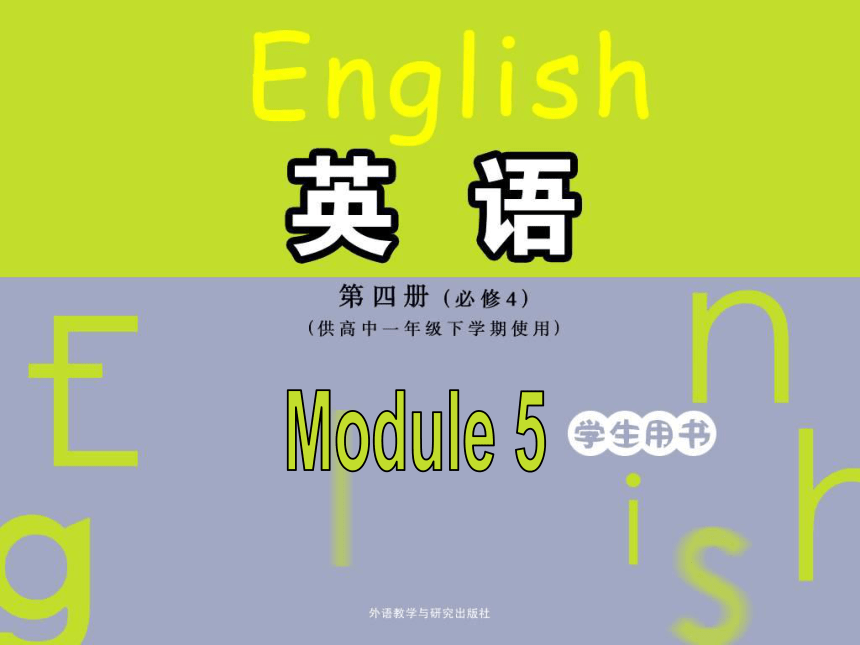
|
|
| 格式 | zip | ||
| 文件大小 | 1.9MB | ||
| 资源类型 | 教案 | ||
| 版本资源 | 外研版 | ||
| 科目 | 英语 | ||
| 更新时间 | 2022-01-30 00:00:00 | ||
图片预览

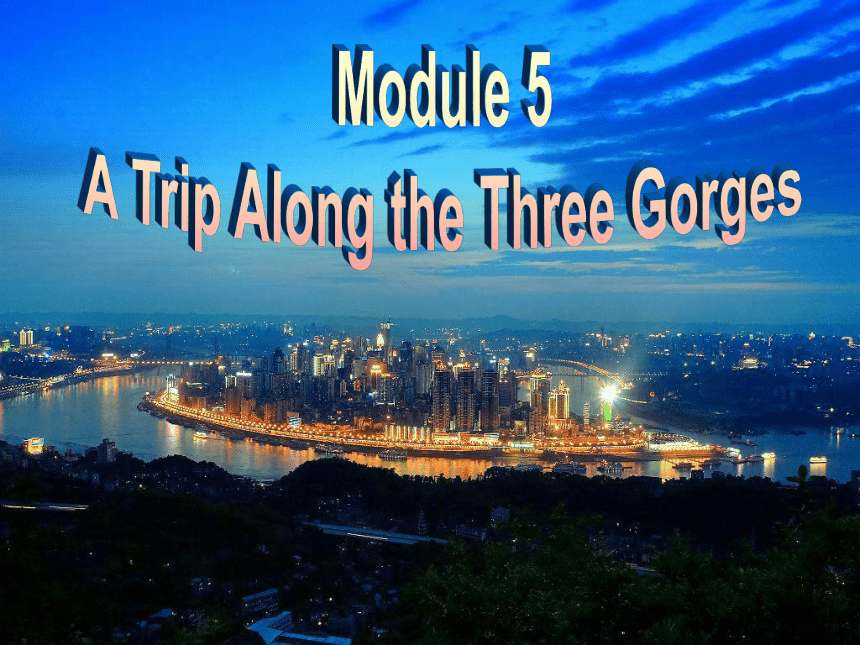
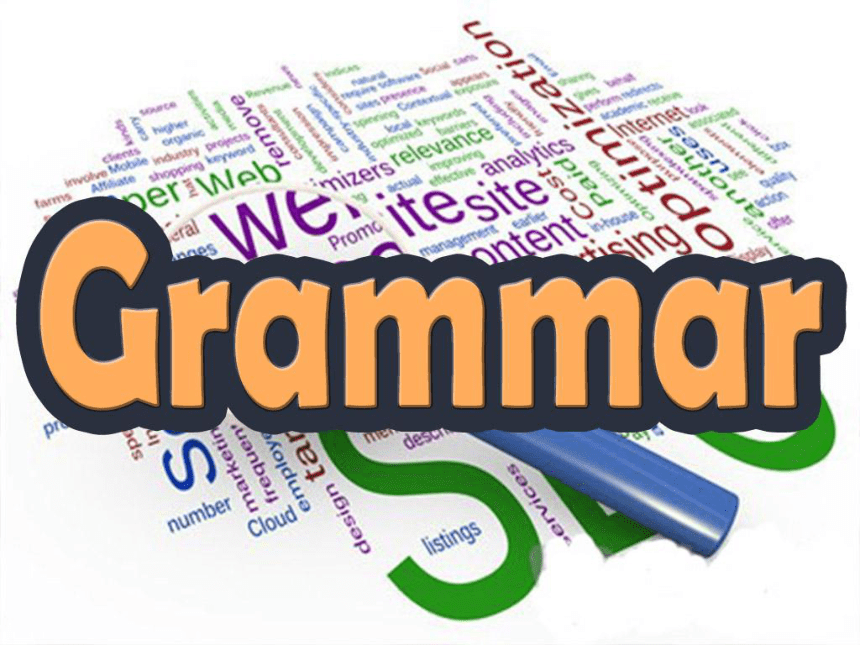
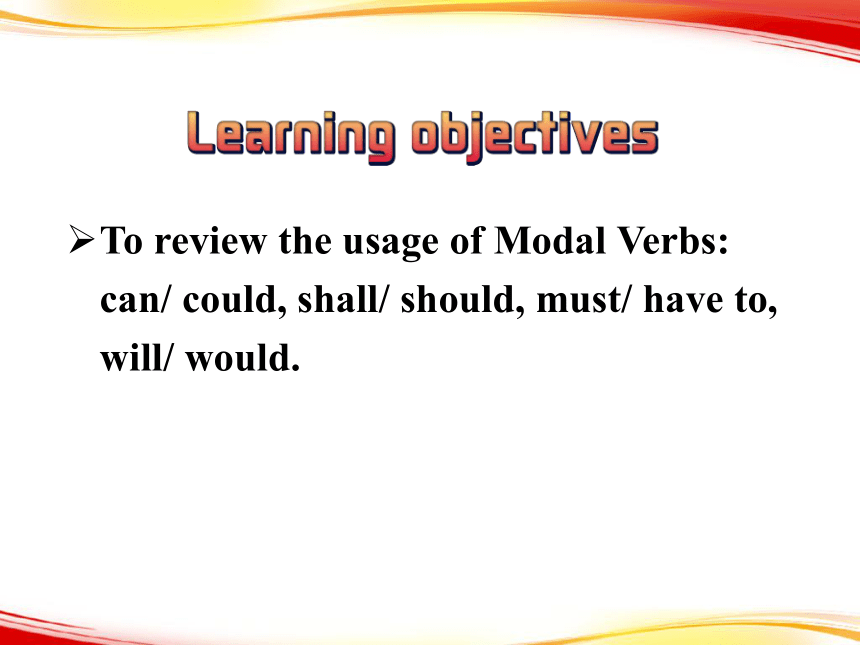
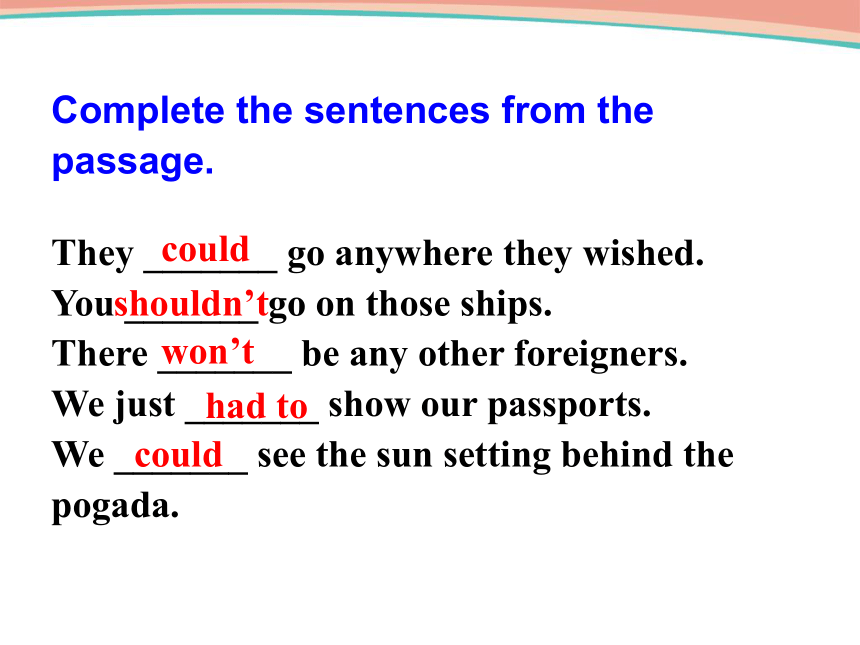


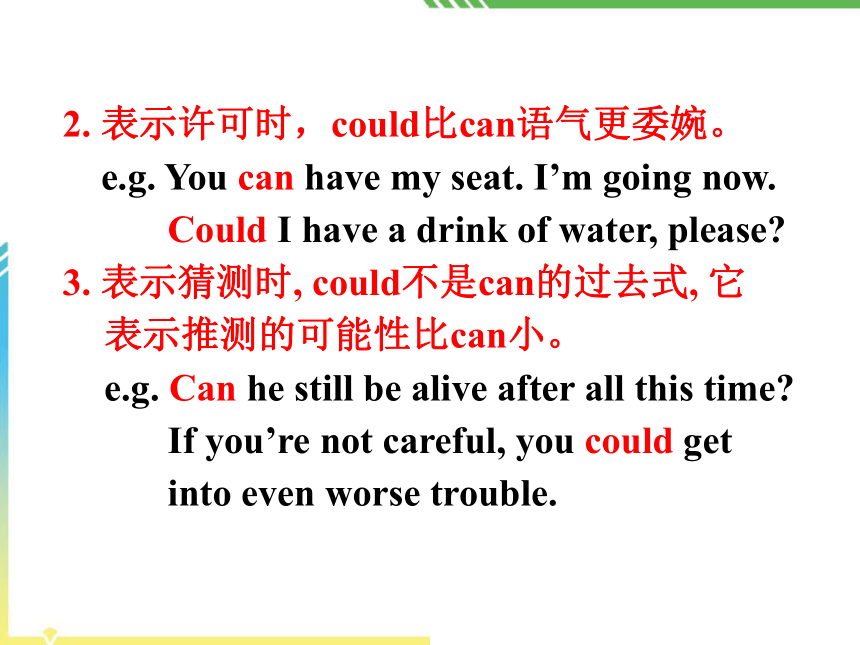

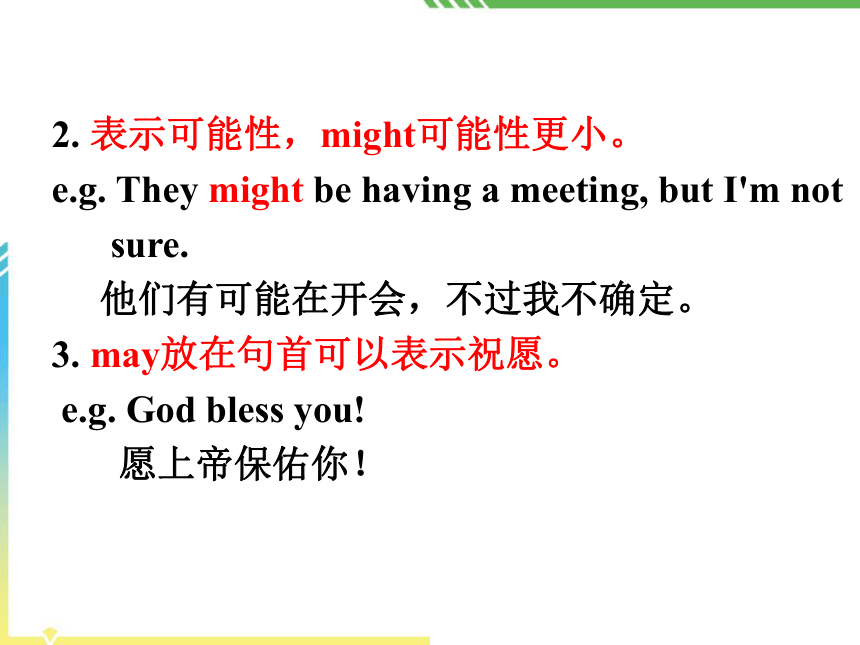
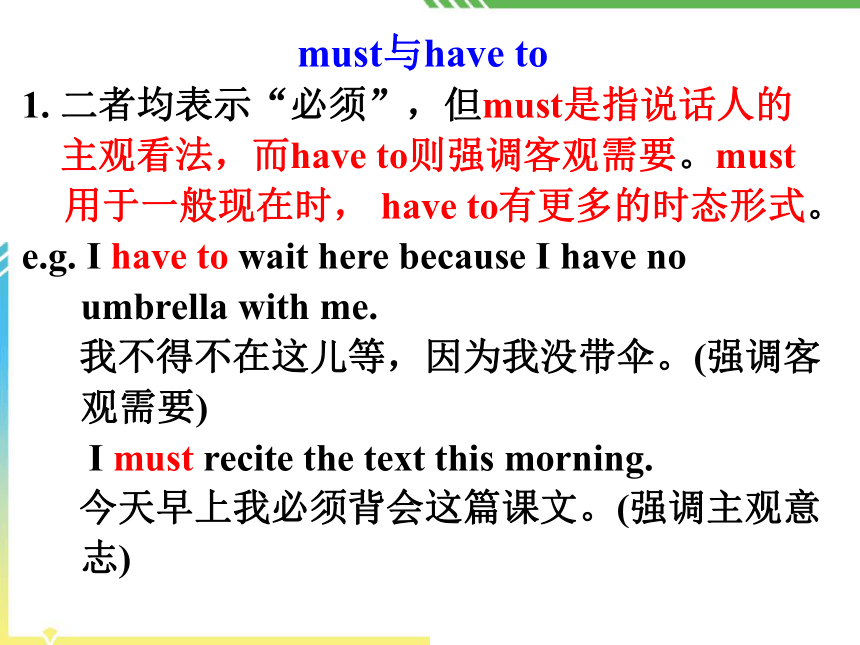
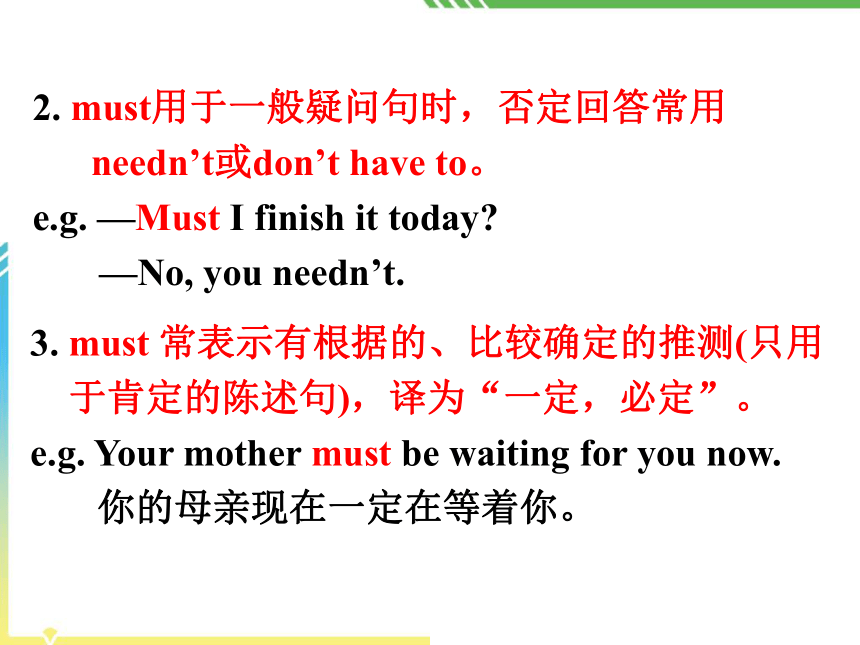
文档简介
(共33张PPT)
Module 5
Module 5
A Trip Along the Three Gorges
To review the usage of Modal Verbs: can/ could, shall/ should, must/ have to, will/ would.
Complete the sentences from the passage.
They _______ go anywhere they wished.
You _______ go on those ships.
There _______ be any other foreigners.
We just _______ show our passports.
We _______ see the sun setting behind the pogada.
could
shouldn’t
won’t
had to
could
Answer the quetions.
1. Which verb is used as the past of must
2. Which verb indicates an ability to do
something
3. Which verb makes a prediction about the
future
5. Which verb is used to give advice
6. Which verb indicates the permission to do
something
could
could
won’t
had to
shouldn’t
can和could
1. 二者都可表示能力,此时could是can的
过去式。
e.g. Even a small personal computer can
store great amounts of information.
I couldn’t get tickets; they were sold out.
2. 表示许可时,could比can语气更委婉。
e.g. You can have my seat. I’m going now.
Could I have a drink of water, please
3. 表示猜测时, could不是can的过去式, 它表示推测的可能性比can小。
e.g. Can he still be alive after all this time
If you’re not careful, you could get
into even worse trouble.
may和might
1. 表示允许或征询对方许可,might表示更加委婉的语气。(有时可与can/could互换)
e.g. —May I watch TV after supper
—Yes, you may./No, you mustn’t.
否定回答时,用can’t或mustn’t,不用couldn’t。
2. 表示可能性,might可能性更小。
e.g. They might be having a meeting, but I'm not sure.
他们有可能在开会,不过我不确定。
3. may放在句首可以表示祝愿。
e.g. God bless you!
愿上帝保佑你!
must与have to
1. 二者均表示“必须”,但must是指说话人的
主观看法,而have to则强调客观需要。must
用于一般现在时, have to有更多的时态形式。
e.g. I have to wait here because I have no umbrella with me.
我不得不在这儿等,因为我没带伞。(强调客观需要)
I must recite the text this morning.
今天早上我必须背会这篇课文。(强调主观意志)
2. must用于一般疑问句时,否定回答常用needn’t或don’t have to。
e.g. —Must I finish it today
—No, you needn’t.
3. must 常表示有根据的、比较确定的推测(只用
于肯定的陈述句),译为“一定,必定”。
e.g. Your mother must be waiting for you now.
你的母亲现在一定在等着你。
shall和should
1. shall用于第一、三人称的疑问句,用来表示
征询对方意见或请求指示。
e.g. Shall I open the window
你要我打开窗子吗?
Manager, someone is waiting for you. Shall he come in?
经理,有人在等你,他可以进来吗?
2. shall用于第二、三人称的陈述句,表示说话
者的允诺、告诫、威胁、命令、规定、必然性
等。
e.g. You shall get what you want if you behave well.
如果你表现好的话,你就会得到你想要的东西。(表示允诺)
He shall be sorry for it one day, I tell you.
有一天他会后悔的,我告诉你。(表示警告)
3. should表示义务或责任、建议或劝告、推断等。
e.g. We should take good care of our
children.
You should give up smoking and
drinking.
With an early start the young men
should be here by 10:00 am.
[点津]
should有时可用于某些从句中,表示说话人惊奇、失望等感彩,常译为“竟然,怎么会”。
e.g. I find it astonishing that he should be so
rude to you.
他竟然对你这样无理,真让我吃惊。
will和would
1. 表示请求、建议,would比will更委婉客气。
e.g. Would/ Will you pass me the ball, please
你可以把球传给我吗?
2. 表示意志、愿望和决心,would用于过去的情况。
e.g. I will help you if you meet with trouble.
如果你有麻烦,我乐意帮你。
She said that she would try her best to help us.
她说她愿意尽自己最大努力来帮我们。
3. would表示过去的习惯性动作;而used to表示过去常常做某事,强调现在不是这样了。
e.g. Each time his mother’s birthday came, he would buy her a present.
每次到他母亲生日的时候,他都要给她买一件礼物。(表示过去的习惯)
My father used to go to the office by bike when he was young.
我父亲年轻的时候总是骑车去上班。(现在不是这样了)
Decide whether the sentences are true or false.
1. Model verbs have only one form in the
present tense.
2. Model verbs all have a present, past and
future form.
3. Some model verbs have more than one
meaning.
4. Model verbs are followed by the infinitive
with to.
5. To ask questions with model verbs you use
the auxiliary verb do.
6. To make a model verb negative you use don’t.
F
T
T
F
F
F
Complete the dialogue with proper model
verbs.
Tom: It’s raining hard. 1. ____________ you mind sharing your umbrella with me
Rose: Of course not. By the way, are you going to see the film in our school tonight
Will / Would
Tom: Yes. Our foreign teacher 2. _________ come with us tonight, but he isn’t sure. He may be at his office. Let’s ask him to go with us.
Rose: I saw him leave his office half an hour
ago. He 3. ______ be working there
at this time. Let’s ask him later. I
heard you’ve got a lot of Australian
coins. 4. _________________________
I have a look
may/might
May/Might/Can/Could/Shall
can’t
Tom: If you would like to come to my
house, I will show them to you at
home this Saturday.
Rose: Wonderful. Where were you
yesterday afternoon I knocked
at the door of your dormitory,
but nobody answered it.
Tom: I was tired after a long hike, so I 5. _____ have been asleep.
Rose: I’m interested in hiking too. Let’s go together next time.
Tom: OK!
must
1.(2018北京卷)In today’s information age, the loss of data _______ cause serious problems for a company.
2.(2018天津3月)
---What’s wrong with the door
---The key has got stuck in it and _______
come out.
can
won’t
1. can (could)表示能力,意为“能够,可以”,表示理论上的可能性,不一定会实现。
2. may (might)表允许,意为“可能,可以”,表示事实上的可能性。在现代英语中,它常可与can 替换使用。
3. must表示说话人主观上的要求、建议或猜测,意为“ 必须,一定 ”。
4. shall
1) 用于第一、三人称,表示“请求”、“建议”或“推荐”。
2) 用于第二、三人称,表示“命令”、“要求”、“许诺”。
5. should
表义务。意为“应该”(某件事宜于做),用于各种人称。
6. will和would
表示“意志”或“愿意”。would 则指过去愿意做某事。
选用括号内合适的内容完成下面句子。
1. I went to the doctor’s yesterday. I waited for half an hour before he ________ (can / could) see me.
2. He ________ (had to / has to) pass an examination before he can start work.
3. You ________ (would / should) pay more attention to your spelling next time.
could
has to
should
4. Frank ________ (may / must) come with us tonight, but he isn’t really sure yet.
5. —I heard they went skiing in the mountains
last winter.
—It ________ (mustn’t / couldn’t) be true
because there was little snow there.
6. Mr. Bush is on time for everything. How ________ (can / should) it be that he was late for the ceremony
may
couldn’t
can
7. I thought you ________ (could / might) like something to read, so I have brought you some books.
8. When you enter the building you ________ (must / might) show the guard your pass.
might
must
1. Finished exercise 3 on page 44.
2. Make sentences according to the
different usages of the reviewed modal
verbs: had to, could, will, should.
Then use these sentences to make a
short passage.
Module 5
Module 5
A Trip Along the Three Gorges
To review the usage of Modal Verbs: can/ could, shall/ should, must/ have to, will/ would.
Complete the sentences from the passage.
They _______ go anywhere they wished.
You _______ go on those ships.
There _______ be any other foreigners.
We just _______ show our passports.
We _______ see the sun setting behind the pogada.
could
shouldn’t
won’t
had to
could
Answer the quetions.
1. Which verb is used as the past of must
2. Which verb indicates an ability to do
something
3. Which verb makes a prediction about the
future
5. Which verb is used to give advice
6. Which verb indicates the permission to do
something
could
could
won’t
had to
shouldn’t
can和could
1. 二者都可表示能力,此时could是can的
过去式。
e.g. Even a small personal computer can
store great amounts of information.
I couldn’t get tickets; they were sold out.
2. 表示许可时,could比can语气更委婉。
e.g. You can have my seat. I’m going now.
Could I have a drink of water, please
3. 表示猜测时, could不是can的过去式, 它表示推测的可能性比can小。
e.g. Can he still be alive after all this time
If you’re not careful, you could get
into even worse trouble.
may和might
1. 表示允许或征询对方许可,might表示更加委婉的语气。(有时可与can/could互换)
e.g. —May I watch TV after supper
—Yes, you may./No, you mustn’t.
否定回答时,用can’t或mustn’t,不用couldn’t。
2. 表示可能性,might可能性更小。
e.g. They might be having a meeting, but I'm not sure.
他们有可能在开会,不过我不确定。
3. may放在句首可以表示祝愿。
e.g. God bless you!
愿上帝保佑你!
must与have to
1. 二者均表示“必须”,但must是指说话人的
主观看法,而have to则强调客观需要。must
用于一般现在时, have to有更多的时态形式。
e.g. I have to wait here because I have no umbrella with me.
我不得不在这儿等,因为我没带伞。(强调客观需要)
I must recite the text this morning.
今天早上我必须背会这篇课文。(强调主观意志)
2. must用于一般疑问句时,否定回答常用needn’t或don’t have to。
e.g. —Must I finish it today
—No, you needn’t.
3. must 常表示有根据的、比较确定的推测(只用
于肯定的陈述句),译为“一定,必定”。
e.g. Your mother must be waiting for you now.
你的母亲现在一定在等着你。
shall和should
1. shall用于第一、三人称的疑问句,用来表示
征询对方意见或请求指示。
e.g. Shall I open the window
你要我打开窗子吗?
Manager, someone is waiting for you. Shall he come in?
经理,有人在等你,他可以进来吗?
2. shall用于第二、三人称的陈述句,表示说话
者的允诺、告诫、威胁、命令、规定、必然性
等。
e.g. You shall get what you want if you behave well.
如果你表现好的话,你就会得到你想要的东西。(表示允诺)
He shall be sorry for it one day, I tell you.
有一天他会后悔的,我告诉你。(表示警告)
3. should表示义务或责任、建议或劝告、推断等。
e.g. We should take good care of our
children.
You should give up smoking and
drinking.
With an early start the young men
should be here by 10:00 am.
[点津]
should有时可用于某些从句中,表示说话人惊奇、失望等感彩,常译为“竟然,怎么会”。
e.g. I find it astonishing that he should be so
rude to you.
他竟然对你这样无理,真让我吃惊。
will和would
1. 表示请求、建议,would比will更委婉客气。
e.g. Would/ Will you pass me the ball, please
你可以把球传给我吗?
2. 表示意志、愿望和决心,would用于过去的情况。
e.g. I will help you if you meet with trouble.
如果你有麻烦,我乐意帮你。
She said that she would try her best to help us.
她说她愿意尽自己最大努力来帮我们。
3. would表示过去的习惯性动作;而used to表示过去常常做某事,强调现在不是这样了。
e.g. Each time his mother’s birthday came, he would buy her a present.
每次到他母亲生日的时候,他都要给她买一件礼物。(表示过去的习惯)
My father used to go to the office by bike when he was young.
我父亲年轻的时候总是骑车去上班。(现在不是这样了)
Decide whether the sentences are true or false.
1. Model verbs have only one form in the
present tense.
2. Model verbs all have a present, past and
future form.
3. Some model verbs have more than one
meaning.
4. Model verbs are followed by the infinitive
with to.
5. To ask questions with model verbs you use
the auxiliary verb do.
6. To make a model verb negative you use don’t.
F
T
T
F
F
F
Complete the dialogue with proper model
verbs.
Tom: It’s raining hard. 1. ____________ you mind sharing your umbrella with me
Rose: Of course not. By the way, are you going to see the film in our school tonight
Will / Would
Tom: Yes. Our foreign teacher 2. _________ come with us tonight, but he isn’t sure. He may be at his office. Let’s ask him to go with us.
Rose: I saw him leave his office half an hour
ago. He 3. ______ be working there
at this time. Let’s ask him later. I
heard you’ve got a lot of Australian
coins. 4. _________________________
I have a look
may/might
May/Might/Can/Could/Shall
can’t
Tom: If you would like to come to my
house, I will show them to you at
home this Saturday.
Rose: Wonderful. Where were you
yesterday afternoon I knocked
at the door of your dormitory,
but nobody answered it.
Tom: I was tired after a long hike, so I 5. _____ have been asleep.
Rose: I’m interested in hiking too. Let’s go together next time.
Tom: OK!
must
1.(2018北京卷)In today’s information age, the loss of data _______ cause serious problems for a company.
2.(2018天津3月)
---What’s wrong with the door
---The key has got stuck in it and _______
come out.
can
won’t
1. can (could)表示能力,意为“能够,可以”,表示理论上的可能性,不一定会实现。
2. may (might)表允许,意为“可能,可以”,表示事实上的可能性。在现代英语中,它常可与can 替换使用。
3. must表示说话人主观上的要求、建议或猜测,意为“ 必须,一定 ”。
4. shall
1) 用于第一、三人称,表示“请求”、“建议”或“推荐”。
2) 用于第二、三人称,表示“命令”、“要求”、“许诺”。
5. should
表义务。意为“应该”(某件事宜于做),用于各种人称。
6. will和would
表示“意志”或“愿意”。would 则指过去愿意做某事。
选用括号内合适的内容完成下面句子。
1. I went to the doctor’s yesterday. I waited for half an hour before he ________ (can / could) see me.
2. He ________ (had to / has to) pass an examination before he can start work.
3. You ________ (would / should) pay more attention to your spelling next time.
could
has to
should
4. Frank ________ (may / must) come with us tonight, but he isn’t really sure yet.
5. —I heard they went skiing in the mountains
last winter.
—It ________ (mustn’t / couldn’t) be true
because there was little snow there.
6. Mr. Bush is on time for everything. How ________ (can / should) it be that he was late for the ceremony
may
couldn’t
can
7. I thought you ________ (could / might) like something to read, so I have brought you some books.
8. When you enter the building you ________ (must / might) show the guard your pass.
might
must
1. Finished exercise 3 on page 44.
2. Make sentences according to the
different usages of the reviewed modal
verbs: had to, could, will, should.
Then use these sentences to make a
short passage.
